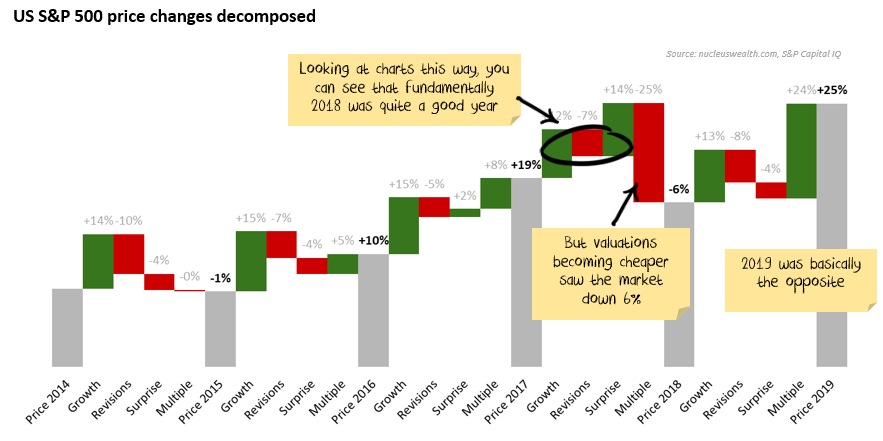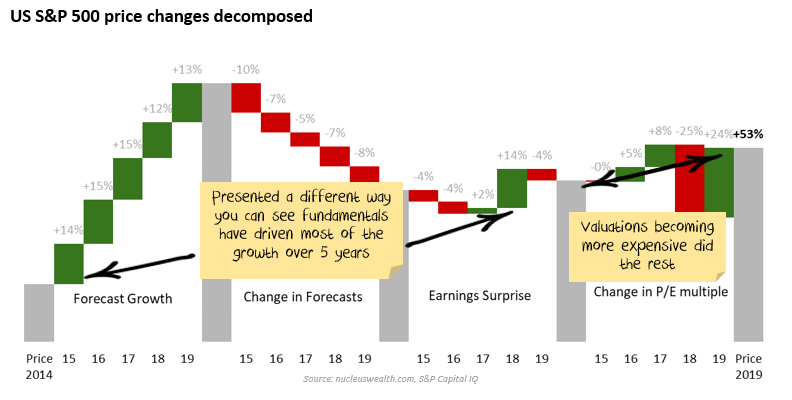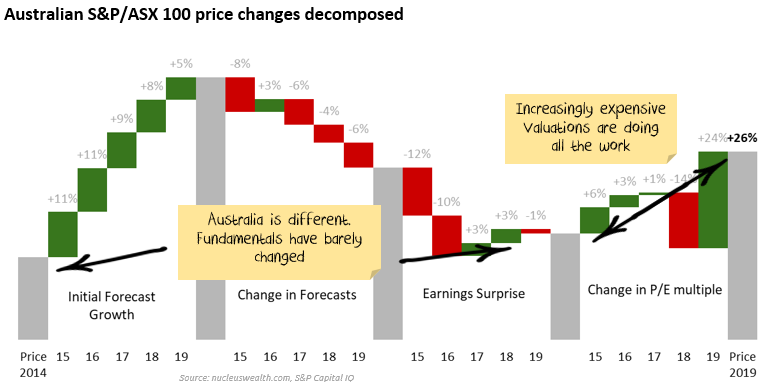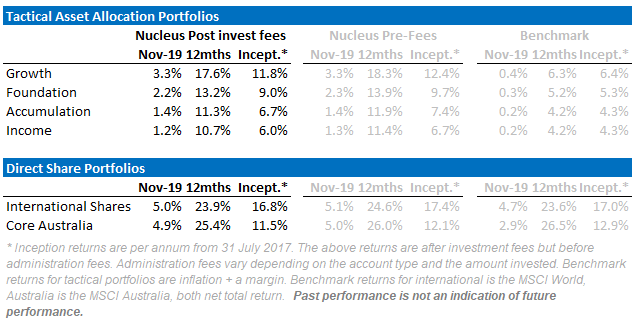November was a stark reminder of the power of narrative in driving returns. World stock markets rose almost 5%, but earnings broadly were downgraded. Our portfolios handily beat all benchmarks over the quarter as our exposure to international stocks offset our large cash holdings. We have been trying to keep enough exposure to international stocks to offset our conservative stance, and in November that trade-off worked particularly well:

Both of our equity only portfolios also outperformed over the month – International up 5.1% and Australia up 5%. Assets are priced for perfection, and we are expecting conditions to be far from perfect:
- corporate earnings are weak globally,
- inflation is almost nonexistent,
- central banks know that they are out of ammunition and are begging governments to borrow,
- largely governments are ignoring these central banks.
What is a bad increase in a stock market?
It is hard to mount an argument against stock indexes going up. But, not all changes in price are of equal quality. For example, say the US S&P 500 increased by 10% in a year, but earnings went backwards. I would consider this to be a lower quality result than a year when the price increased by the same amount, but earnings increased by 20%. i.e. a change in price that is justified by a change in earnings is more sustainable than a change in the multiple that investors are prepared to pay.
If you made the greatly simplifying assumption that all markets were priced off 12 month forward expected earnings then we can examine the quality of stock market returns from year to year by looking at how much of the return came from the following:
Change in Price =
+/- Growth expected in earnings from the first year to the second year
+/- Revisions in growth expectations from the first year to the second year
+/- Earnings surprise as first-year earnings go from a forecast to an actual
+/- Change in valuation multiple
Looking at price changes in this way, the US market growth doesn’t look quite as bad:




Rational Optimism or Irrational Exuberance?
We posed the question last month that with the price/earnings ratio back above 18x, is it:
- Investors bidding prices up in front of another earnings boom?
- Or is it a sign prices have run in front of fundamentals?
The last few times the P/E ratio hit 18x:
- In 2003 the US was recovering from the tech wreck, spurred on by loose monetary policy and a nascent housing boom.
- In 2009 the market was recovering from the financial crisis, just about to post a 30%+ increase in profits.
- In 2017 Trump tax cuts were just about to turbo-charge profits.
It is much harder now to find the reason for profits to boom from here. Most investors arguing for rational optimism point to:
1. Trade war resolution
Some say a trade war resolution will spur earnings growth. I would argue:
- It is a little unclear what deal has actually been done – different insiders have different stories
- the preliminary agreement has little that will spur earnings
- given the problems getting a preliminary deal over the line, the larger deal is a long (long) way away from being resolved
2. Central bank support
The other core argument is central banks have moved from tightening to loosening, which will turn economic conditions positive. I have sympathy for this argument eventually, but not yet. In the meantime:
- each successive round of easing has less and less of an effect on the economy
- the amount of central bank loosening is still relatively limited
- it is likely economies will need to get worse before central banks act more decisively
For my part, it is too early to invest based on central bank support.
3. The goldilocks zone
A different argument notes that stocks are in a goldilocks zone – enough growth to keep profit strong, not so much growth that central banks need to raise rates. Inflation, in particular, wage inflation, remains low. This means costs will remain constrained, which is good for profit margins. There is plenty of truth in this argument. The more important question is how much do you want to pay for stocks in the goldilocks zone given:
- being in the goldilocks zone helps keep profits grinding high, but it isn’t a reason for earnings to rocket higher
- there is a risk that stocks leave the goldilocks zone
I’m arguing that stocks in the goldilocks zone are attractive – just not so attractive that I’m prepared to pay the same price the market usually pays just before a massive earnings boom.
So where does an asset allocator turn?
If the increase in valuations is a rational response by markets to improved economic conditions, then we should be buying stocks. We don’t think it is. Another argument is that there is no alternative. Stocks are expensive, but so is everything else. This is partly true. Bonds are expensive, but cash is always fair value. We are also of the view that Australian bonds have room to become more expensive. That said, we have been moving our asset allocation around a little recently. We have topped up on 5 year bonds as rising bond yields conflict with our negative view on the Australian economy. We also added some more UK exposure and continue to shift our stock selection into stocks that we believe will benefit in the medium term from companies moving supply chains away from China. Longer term, stagnant growth is going to be on the menu until we see governments spending money. And probably “helicopter” money. Given the current state of economics, that will probably take a sizeable economic crisis. Until then, we expect more of the same – slow growth and a grind lower.
November Performance

We are comfortable with the view that the defensive position is warranted. If markets shoot higher, then we will underperform, but we think the trade-off is justified. Downside protection is more important at this point in the cycle than chasing stock markets higher.
Investment Outlook
Australian shares are still considerably more expensive than most international comparisons with weaker growth expected. We retain large cash and bond balances to hedge against volatility and with the expectation capital protection will be necessary for the next few months. Our key focus is on:
- Chinese growth, gauging the extent of the slow down and the policy response to the trade war
- Trying to work out how sustainable the effect of the Australian election will be on house prices
- Gauging the damage that a Boris Johnson led Brexit might cause
————————————————-
Damien Klassen is Head of Investments at the Macrobusiness Fund, which is powered by Nucleus Wealth.
The information on this blog contains general information and does not take into account your personal objectives, financial situation or needs. Past performance is not an indication of future performance. Damien Klassen is an authorised representative of Nucleus Wealth Management, a Corporate Authorised Representative of Nucleus Advice Pty Ltd – AFSL 515796.